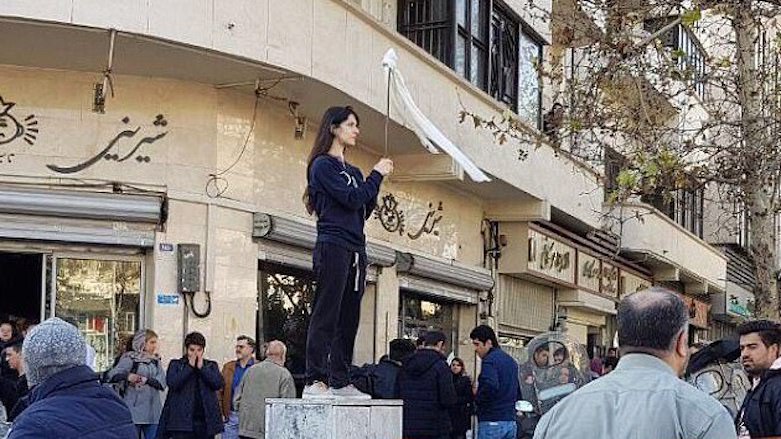Woman who removed hijab during Iran protests released, lawyer confirms

ERBIL, Kurdistan Region (Kurdistan 24) – A woman who became a symbol during the country-wide protests in Iran for removing her hijab (headscarf) and waving it in the streets has been released from custody, an Iranian human rights lawyer said on Sunday.
The woman, identified as 31-year-old Vida Movahed with a 20-month-old daughter, was released after authorities arrested her for participating in the Iranian protests.
Iranian human rights lawyer Nasrin Sotoudeh, who took on the case for the woman, nicknamed the “Girl of Enghelab Street,” confirmed Movahed’s release.
According to Sotoudeh, during her visit on Sunday to follow-up with the case, she was informed by officials at the prosecutor’s office that the woman had been released the previous day.
“The girl of the Enghelab Avenue has been released,” the lawyer wrote on Facebook.
“I hope they don’t fabricate a legal case to harm her for using her basic rights,” Sotoudeh added. “She has not done anything wrong to deserve prosecution. Hands off her please.”
Movahed was arrested on Dec. 27, the first day of anti-government protests in Iran.
Social media users around the world used the hashtag “#WhereIsShe” to protest the 31-year-old’s detention, as concerns about her whereabouts increased.
People in #Iran are asking for the whereabouts of the woman who took off her #hijab to protest the mandatory Islamic dress code using the hashtags #دختر_خیابان_انقلاب_کجاست and #Where_Is_She
— Armin Navabi (@ArminNavabi) January 18, 2018
She was reportedly arrested shortly after. #IranProtestspic.twitter.com/G6oKHIPA68
The hijab-less woman received international fame as videos of her removing her headscarf and waving it on a stick went viral during the Iranian protests where at least 20 people were killed and hundreds arrested.
Since the Islamic Revolution in 1979, women in Iran have been forced to cover their hair and dress modestly in public places.
Those who violate Iran’s Islamic legal code could face up to two months in prison, according to Sotoudeh.
Meanwhile, another woman was arrested on Monday in Tehran for removing her headscarf and waving it on a stick in protest of the mandatory dress code in the country.
